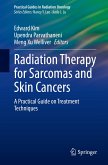This new edition summarizes the data and techniques for hypofractionation and stereotactic radiation in a clinically-accessible way. Hypofractionated radiation therapy, which consists of larger-dose radiation treatments that are given over a shorter time period compared to conventional radiation fraction sizes, is used to treat a variety of cancers, including prostate, breast, lung, and colorectal. Conventional radiation therapy and hypofractionated radiation therapy often have different effectiveness rates for cancer treatment and have different impacts on normal tissues in terms of causing toxicity. There is a significant and continually evolving body of literature on the use of different dosing regimens to treat a variety of cancers, and radiation oncologists need to keep up with the various dosing schedules, the effect of each regimen on cancer control in different cancers, and how the different schedules affect each organ in terms of toxicity.
This book provides concise, up-to-date information ranging from commonly-used dose-fractionation schemes for hypofractionated and stereotactic body radiotherapy to simulation and treatment specifications to published safety and efficacy data. Chapters additionally examine the biological rationales for the efficacy of hypofractionated radiation; present clinical studies that demonstrate the efficacy and safety of hypofractionated radiation treatment in a variety of cancers; and describe the advances in technology that have allowed hypofractionated radiation to be safely given. All chapters are fully revised with the latest treatments and updated effectiveness and toxicity of previously discussed treatments, all based on recent clinical trials and large analytical studies.
This is an ideal guide for radiation oncology clinicians and trainees.
Hinweis: Dieser Artikel kann nur an eine deutsche Lieferadresse ausgeliefert werden.
This book provides concise, up-to-date information ranging from commonly-used dose-fractionation schemes for hypofractionated and stereotactic body radiotherapy to simulation and treatment specifications to published safety and efficacy data. Chapters additionally examine the biological rationales for the efficacy of hypofractionated radiation; present clinical studies that demonstrate the efficacy and safety of hypofractionated radiation treatment in a variety of cancers; and describe the advances in technology that have allowed hypofractionated radiation to be safely given. All chapters are fully revised with the latest treatments and updated effectiveness and toxicity of previously discussed treatments, all based on recent clinical trials and large analytical studies.
This is an ideal guide for radiation oncology clinicians and trainees.
Hinweis: Dieser Artikel kann nur an eine deutsche Lieferadresse ausgeliefert werden.








